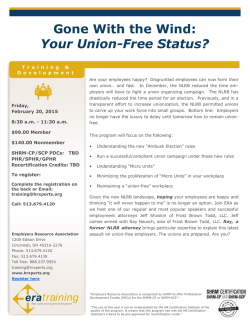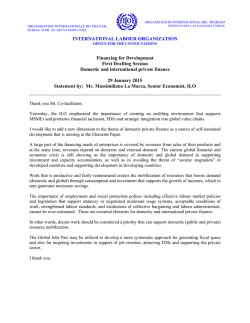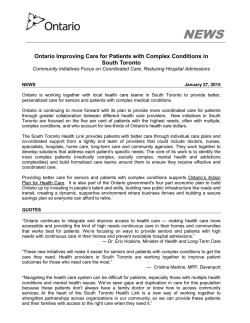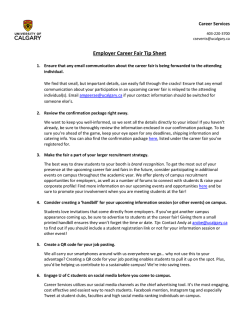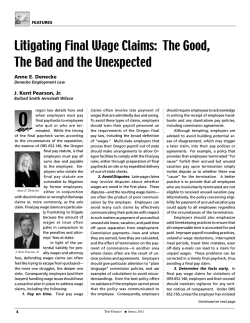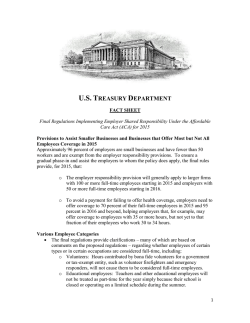
taming the wild west: health support workers, regulation and
CCHE/CCES, HSPRN, CRNCC/RCRSC University of Toronto 10am-12noon Friday 30 January 2015 TAMING THE WILD WEST: HEALTH SUPPORT WORKERS, REGULATION AND PUBLIC PROTECTION Professor Mike Saks Research Professor University Campus Suffolk, UK & Visiting Professor, Institute of Health Policy, Management and Evaluation (IHPME), University of Toronto CONTEXT: MIKE SAKS I am spending some time here as Visiting Professor at IHPME – aiming to add value to its operation. I have variously: • served on the Executives of universities in the UK, including as Provost and Chief Executive. • published extensively on health and social care – particularly on professions, regulation and research. • been involved in funded health and care research internationally. • worked as an adviser to government and the professions in Canada and the UK. I hope today I shall be able to contribute positively to the CCHE/CCES, HSPRN, CRNCC/RCRSC agenda as sponsors of this presentation. MY ROLE I would like to share my knowledge of researching health support workers for the UK government. Despite the topic, though, on ‘Taming the Wild West’, I should stress that I am not Wyatt Earp. Nonetheless, I aim to add to the discussion as to how the regulation of personal support workers more generally can be enhanced in what is currently the Wild West. TAMING THE WILD WEST: HEALTH SUPPORT WORKERS, REGULATION AND PUBLIC PROTECTION 1. THE WILD WEST 2. PERSONAL SUPPORT WORKERS IN ONTARIO 3. HEALTH SUPPORT WORKERS IN THE UK: POLICY CONTEXT 4. THE HEALTH SUPPORT WORKER STUDY 5. FINDINGS OF THE STUDY 6. SELECTED DATA FROM THE STUDY 7. THE REGISTER AND EMPLOYER RESPONSIBILITIES 8. STUDY RECOMMENDATIONS 9. THE FOLLOW UP TO THE STUDY 10. CURRENT DEVELOPMENTS 11. CONCLUSION 1. THE WILD WEST THE WILD WEST The Wild West popularly refers to the period in the second half of the nineteenth century in the United States when there was little law and order. At this time bandits, outlaws and others ran wild to the detriment of local populations. THE TAMING OF THE WILD WEST However, the Wild West was ultimately tamed by regulation. This involved the establishment of government through, amongst other things, the appointment of sheriffs and deputies who managed to reduce lawlessness to the benefit of the wider public. 2. PERSONAL SUPPORT WORKERS IN ONTARIO PARALLELS WITH PERSONAL SERVICE WORK IN ONTARIO It is argued here that the metaphor of the Wild West is highly applicable to the health and social care environment in Ontario. This vital and large part of the health and social care labour force, as in the UK, has largely been overlooked in terms of regulation, in contrast to health professional groups in this area. PERSONAL SERVICE WORKERS IN In Ontario, as in other jurisdictions nationally and internationally, personal support workers are now providing ever more care to vulnerable individuals – including older persons with chronic health and social needs. Some of this was previously provided by families and regulated health professionals – in a scenario where informal carers and groups such as doctors and nurses remain important players. ONTARIO PERSONAL SERVICE WORKERS: (A) BENEFITS There are clear benefits of personal service workers as they can deliver essential support for everyday living – from homemaking and meals to personal care. In so doing, they can: • Promote independence and quality of life • Reduce loads on family caregivers • Provide a more cost-effective care option for stretched health care systems. ONTARIO PERSONAL SERVICE WORKERS: (B) CHALLENGES Despite their importance, personal service workers are not regulated by government and have no established standards of education/practice. Registration for state employment in Ontario is not particularly meaningful – with casuals outside labour legislation. Such workers also often provide care to vulnerable persons in situations where they are not monitored or subject to peer review – such as in the homes of seniors. Personal support workers frequently too have migrant status and low pay – the latter now being addressed by government. THE UK STUDY OF HEALTH SUPPORT WORKERS There are many common issues in other jurisdictions, including the UK. The first systematic study of support workers operating in the health environment in the UK was by Saks et al. (2000) Review of Health Support Workers. This extensive report was commissioned by government through the UK Departments of Health to map and consider the regulation of health support workers. It was compiled by a multi-disciplinary team from De Montfort University and Warwick University, chaired by Professor Mike Saks. The team included more than a dozen players – from health and social care professionals to academics with expertise in economics, law and policy. 3. HEALTH SUPPORT WORK IN THE UK: POLICY CONTEXT THE POLICY CONTEXT: (A) PUBLIC PROTECTION A major policy context was public protection. Previous consideration of public protection was focused on improving professional governance – a theme that ran throughout the 1997-2010 Labour government. This was later highlighted by the White Paper Trust, Assurance and Safety: The Regulation of Health Professionals in the 21st Century (2007), produced in the wake of the Shipman Inquiry to address the failure of the self-regulatory medical profession to pick up the serial killing Dr Harold Shipman who murdered 200+ patients. THE POLICY CONTEXT: (A) PUBLIC PROTECTION (con.) The significance of the Shipman case and the subsequent Shipman Inquiry – which followed in the wake of scandals at Bristol Royal Infirmary and Alder Hey – cannot be overstated. The case highlighted that even a group like the medical profession could not satisfactorily regulate itself. The main focus of policy was on medicine, but the reforming Labour government included in its purview other professional groups in health and social care – such as nurses, midwives and social workers. Support workers, though, were also seen as significant in terms of the need for public protection. THE POLICY CONTEXT: (B) COST CONTAINMENT Another major policy context of the study was that the modernising Blair government of the time wished to contain rising healthcare costs. From a cost perspective, labour costs in the NHS are around two-thirds of all healthcare costs. Government was also faced with European Union workforce directives that decreased junior doctors’ working hours. From an economic viewpoint, in face of rising public demand, a key strategy was to change the roles and tasks carried out by healthcare staff for cheaper forms of labour through role enhancement, substitution, delegation and innovation (McKee et al., 2006). In terms of cost, health support workers were a form of labour substitution for more highly paid professionals, including through the recruitment of migrant labour. THE POLICY CONTEXT: (C) FROM HOSPITAL TO COMMUNITY Although they still have not received the attention they deserve in the UK, the importance of support workers in terms of policy increased with the shift in healthcare from hospital to the community (Ham 2009). This shift was driven by changes in health and social care treatment options which favoured care delivery in primary, preventive and self care in community settings In this context, professional rigidities were felt to have prevented: • Workforce flexibility • Changes in skill mix • Team working. These factors have led to the increasing employment of support workers within a climbing frame of opportunity based on occupational standards and competencies. THE POLICY CONTEXT: (D) HEALTH AND SOCIAL CARE INTERFACE Another reason why the study was commissioned from a policy viewpoint was that more attention needed to be given to the fluid boundaries between health and social care – in which support workers play an integrative role. This was an aspect of the commissioning brief, but has been given increasing focus under the current Coalition government in the 2012 Health and Social Care Act. This gave recognition to the joined up nature of these areas by, for example: • Incorporating social work with allied health professions in the Health and Social Care Professions Council • Forming the joint oversight body, the Professional Standards Authority for Health and Social Care • Creating Health and Wellbeing Boards alongside Clinical Commissioning Groups at local level. 4. THE HEALTH SUPPORT WORKER STUDY THE TERMS OF REFERENCE OF THE HEALTH SUPPORT WORKER STUDY In an area with little research despite the policy context, the following summary terms of reference were set for the Saks et al (2000) study of health support workers: • Examine the roles, functions and responsibilities of support workers employed in healthcare settings, having regard to the overlap of people who may also work in social care settings. • Make recommendations to the four UK Health Departments on the extent of regulation in the interests of public protection and the practical means of providing it – taking account of the costs and benefits, the government regulation of unqualified staff in the social care sector, and the need to ensure emphasis on the responsibilities of employers. WHAT THE STUDY DID AND DID NOT DO At the behest of the Departments of Health: • The review focused on the paid and self-employed workforce and excluded unpaid volunteers, carers and users, who also make a crucial contribution to health and social care. • Arrangements for social care support workers, who were to be regulated through the General Social Care Council, were also excluded from the brief. Within these constraints, as regards the health support workforce, the study employed a systematic mixed methods approach – which will now be outlined. THE METHODS EMPLOYED IN THE STUDY The methods used included: • A literature review on health support workers and related occupations. • A structured questionnaire sent to the Chief Executives of NHS trusts, health authorities, social services and other public and private sector bodies. • Focus groups conducted with public and private sector participants • Open regional workshops held for health support workers, professionals, employers and service providers, users and carers in the four UK countries. • In-depth individual interviews with several dozen key stakeholders working in professional and other bodies at local, regional and national levels. • A website set up to elicit comments. The data so gathered contributed to the final report to the UK Departments of Health. FRAMEWORK OF THE STUDY Despite the changing policy context, this watershed study went beyond previous government reports – for example, the 2000 NHS Executive Consultation Document entitled A Health Service of All the Talents. Previous work had concentrated more or less exclusively on the health professional labour force. In this first UK study of health support workers, the definition of a health support worker in the study was: ‘A worker who provides face-to-face care or support of a personal or confidential nature to service users in clinical or therapeutic settings, community facilities or domiciliary settings, but who does not hold qualifications accredited by a professional association and is not formally regulated by a statutory body.’ Note the similarities and differences from the definitions of personal support workers in Ontario. 5. FINDINGS OF THE STUDY GENERAL FINDINGS IN THE STUDY Within this framework, health support workers in the UK generally were found to be: • A diverse group working across health/social care and formal/informal care boundaries. • Working in many sectors from the state to private health care, and from hospitals and residential care to the home. • Marked by very large numbers – there were well over one million personnel in the health support sector alone (as compared to two-thirds of a million nurses and a quarter of a million doctors). • A flexible labour force which was largely female and low paid in nature – with a high level of part-time work. TITLES OF HEALTH SUPPORT WORKERS These findings highlighted that health support work in the UK was the Wild West – underlined by the limited regulation of the 300+ types of health support workers: • Unqualified workers within clinical or therapeutic teams in hospitals and other contexts, such as nursing, physiotherapy and radiography • Autonomous but unregulated practitioners within emerging professions like operating department practitioners and phlebotomists • Workers providing front-line support for patients, users or carers in the community and homes, such as community rehabilitation assistants • Workers providing support to service users in group care settings like care assistants • Support workers employed directly by service users, sometimes called personal assistants. For good measure, titles were employed inconsistently and did not necessarily refer to similar work roles. QUALITY AND HEALTH SUPPORT WORK The methods for checking quality in protecting patients in health support work involved employers, professional groups and support workers themselves, including: • Pre-service checks by employers to assess suitability • Regular structured supervision and line management by qualified staff • Opportunities provided by employers for continuing educational development. There was also a legal framework of safeguards that covered recruitment, employment, the termination of employment and health and safety at work. In addition, voluntary registers covered certain health support worker groups. Some protection for the public was also given through education and training, from National Vocational Qualifications to Diploma/Degree courses. 6. SELECTED DATA FROM THE STUDY (A) LEVELS OF RISK Despite the quality checks, serious questions arose about the extent to which these measures were consistently applied to support workers in practice and whether they were sufficiently robust to protect the public. These were underlined by the following data that were gathered from the Chief Executives: Levels of risk as perceived by Chief Executives Level of risk Number Considerable 42 Moderate 41 Small but significant 57 Minimal 19 Total 159 Percentage 26 26 36 12 100 (A) LEVELS OF RISK: SUMMARY The survey undertaken during the review showed that: • Most Chief Executives felt that in the absence of more formal regulation there were risks to the public when support workers were employed. • The majority of the respondents felt that these risks to the public were significant and a quarter thought that these risks were considerable. When views about potential risks were explored in the focus groups, three issues were highlighted: • The difficulty of identifying unsuitable people and excluding them from the workforce • The problem of loose role definitions, with the danger that less well-qualified staff would perform tasks beyond their competence • The lack of standards for training and assessing competencies. (B) PUBLIC PROTECTION PRACTICE The Chief Executives reported that they were currently employing the following practices as regards public protection: Public protection practice reported by Chief Executives Type of safeguard Number Percentage Pre-service checks 142 92 Line management 138 89 Information about unsuitable staff 135 88 Staff development opportunities 135 88 Regular supervision 112 72 Codes of ethics/practice 71 46 Voluntary register 13 8 Other 58 37 (B) PUBLIC PROTECTION PRACTICE: SUMMARY The questionnaire responses suggest that most organisations: • • • • Were carrying out pre-service checks Had management controls in place Provided staff development opportunities Had accessed information on unsuitable individuals. However, less than three-quarters of respondents had introduced regular supervision for support workers and less than half had a code of ethics/practice for staff in place. Very few used the voluntary registers available. The confidence that this engendered about health support workers operating in organisational contexts was therefore rather mixed – and not very convincing. (C) PERCEIVED NEED FOR FURTHER REGULATION The opinions of Chief Executives on the need for further regulation of health support workers were as follows: Views on further regulation reported by Chief Executives Reply Number Additional regulation needed 127 Direct regulation required 111 Employer’s responsibility 50 Other 9 Percentage 92 81 37 7 Throughout the review, participants were also asked about the effectiveness of existing safeguards – views on these were mixed in terms of their strengths and weaknesses. (C) PERCEIVED NEED FOR FURTHER REGULATION: SUMMARY Overall there was wide agreement among Chief Executives on the need for further regulation. One third thought employers should have more responsibility for regulating health support workers and over three-quarters supported direct regulation through a supervisory body. Most respondents favoured further regulation to: • • • • Improve standards and consistency Protect the public from dangerous individuals Respond to the growing complexity of tasks Increase self-esteem by recognising status and skills. However, some contrary arguments were also made: • • • • Serious cases of abuse were rare A register would introduce rigidities into the system Supply may be reduced if minimum qualifying standard Costs of a system of registration could be prohibitive. (D) NEW FORMS OF REGULATION In terms of new forms of regulation, the following views emerged from Chief Executives: Preferred features of new forms of regulation by Chief Executives supporting further regulation Mechanism for regulation Codes for workers Pre-service checks Information on unsuitable Formal education levels Codes for employers Mandatory register Disciplinary procedures Protection of title Other Number 127 124 119 110 107 106 88 45 8 Percentage 92 90 86 80 78 77 64 33 6 (D) NEW FORMS OF REGULATION: SUMMARY Among the large majority of Chief Executives supporting further regulation, the degree of support depended on the form of the regulation. In this respect more than three-quarters of Chief Executives supported: • • • • • A mandatory register Codes for workers and employers Formal education level Pre-service checks Access to data on those unsuitable for employment. Respondents were less interested in professional attributes, such as disciplinary procedures and the protection of title, but generally wanted to see: • A tightening up of the process of recruitment • The further development of codes of conduct/practice • Entry thresholds for training and qualifications. 7. THE REGISTER AND EMPLOYER RESPONSIBILITIES SUPPORT FOR A REGISTER Support for a register was expressed strongly in most of the regional workshops. It was felt that this would: • Address concern that unsuitable individuals could evade pre-employment checks • Reduce the opportunity for people to move from one employment to another following a problem • Reassure employers and the public that employees were reputable and competent. There was, however, debate about how a register might actually operate. The following issues were seen as particularly critical: • • • • Entry requirements The mechanism for registration The information to be held Meeting the costs. EMPLOYER RESPONSIBILITIES Increased employer responsibilities for regulation were seen as a supplement to registration by supporters of a register. Opponents of a register regarded increasing regulation by employers as a substitute for it. In this respect, there was much support in the review for expanding employer responsibilities as a means of effectively regulating health support workers. The related introduction of good practice standards for employers therefore gained widespread support, alongside the establishment of a register for health support workers. CHALLENGES TO REFORM Irrespective of the approach to regulation adopted, there was agreement among participants that the issue should be addressed as a priority. Data from the consultative phases of the research identified the main challenge to change as being the costs involved in terms of money and time – especially for smaller, independent employers. Resistance to regulation by support workers was also seen as a barrier – as was the complexity of designing a transparent, user-friendly and efficient regulatory system for a varied workforce. However, both trade unions representing support workers and professional associations were positively disposed to increased regulation on appropriate terms. WEAKNESSES OF THE EXISTING REGULATORY SYSTEM Such underlying support for change was not surprising as the weaknesses of the existing regulatory system were recognised by employers and staff alike. They believed that existing measures: • Had developed piecemeal • Were being applied inconsistently • Gave little guarantee of public protection. There was also support for the standardisation of occupational titles, skills and competencies for health support work. 8. STUDY RECOMMENDATIONS KEY RECOMMENDATIONS OF THE STUDY The feedback from the various methods employed in the research allowed the research team to make the following recommendations: • Enhance the directions and guidance given to employees • Improve the management/supervision of support workers • Place a greater responsibility on employers/agencies • Further inform service users about their position and rights • Enhance the training and qualifications of health support workers • Introduce a register for health support workers. THE RECOMMENDATION OF A REGISTER It was felt that a register would incur the highest costs, but could be introduced gradually. In the first instance, a limited register based on ‘negative’ pre-service checks and periodic monitoring of criminal and other records could be established. Only those on the register would be legally entitled to be employed as health support workers. At a later stage, a more comprehensive mandatory register with codes of ethics as a generic one-stop shop with cognate occupational groups could be introduced. However, it was felt that careful consideration should be given to the costs and where these would fall given that many support workers are in part-time, low-paid work. One possibility was to apportion these between government, employers and those wishing to register. REGULATORY DEBATE While most participants favoured statutory regulation, some support workers noted in focus groups that regulation might be burdensome and reduce recruitment. Others felt that porters and administrative and clerical staff should also be regulated. However, the majority of participants in the study were in favour of professional bodies taking on the regulation and oversight of cognate support worker groups. Professional bodies too wanted to regulate groups closely related to their own profession – as happens in the case of the General Dental Council in relation to dental assistants and dental hygienists. But as there was no consensus about which professional body should set/enforce standards, it was concluded further discussion was required. 9. THE FOLLOW UP TO THE STUDY IMMEDIATE AFTERMATH OF THE REVIEW The review report was widely circulated in government circles, with debate over the costs and benefits of a register impeding its release. In 2004 the Department of Health issued a consultation document to health staff in England and Wales drawing on the health support worker review and the government’s patient protection agenda. It proposed an extension of regulation beyond the existing health professions with selective statutory regulation of health support workers by 2007 through a Health Occupations Committee of the Health Professions Council. This was to avoid unnecessary bureaucracy and cost. It was also noted that some health support workers were already professionalising separately – such as operating department practitioners who became registered as a profession under the Health Professions Council. FURTHER DEVELOPMENTS: SOCIAL CARE WORKERS Support staff in social care meanwhile were put under the regulatory authority of the General Social Care Council, established in 2001 to protect service users, carers and the public. A register was set up for social workers shortly after, along with a Code of Practice for social care workers and employers. The Code of Practice for employers covered, amongst other things, the rights and interests of service users and carers. Employers were also made accountable for the knowledge and skills development of employees. Although the General Social Care Council was dissolved and incorporated into the Health and Care Professions Council in 2012, this represented positive progress. FURTHER DEVELOPMENTS: HEALTH SUPPORT WORKERS Logic suggests that health support workers and their clients should be protected to the same standard as those in social care, but this has not happened. Little progress has been made either on selective professionalisation for health support workers – despite the 2006 Donaldson and Foster reviews of the regulation of doctors and other health workers in the wake of the Shipman Inquiry. The Foster review, for example, recommended monitoring of the results of a piloted nonmandatory register in Scotland that was not felt to be the way forward by the Saks et al. (2000) study. It is not surprising that since this time there have been strong and repeated calls for a mandatory register from various parties – not least from bodies like the Royal College of Nursing. 10. CURRENT DEVELOPMENTS POSTSCRIPT: CURRENT POSITION Although some joint development has occurred – including through the introduction and enhancement of the Care Quality Commission which regulates health and social care – scandals in this area are still occurring. This is highlighted most recently by the 2013 Francis Report that was written in the wake of the poor standards and risk to patients discovered at the MidStaffordshire NHS Trust – characterised not only by unacceptable leadership and management, but a negative culture of care amongst professional and health support workers. The Francis Report led to An Independent Review into Healthcare Assistants and Support Workers in the NHS and Social Care Settings (2013), led by Camilla Cavendish – the recommendations of which will now be summarised. CAVENDISH RECOMMENDATIONS Recruitment, training and education • A Certificate of Fundamental Care should be introduced, with minimum training standards. • A Higher Certificate of Fundamental Care should also be developed, with more advanced competences. • Support workers should complete the Certificate of Fundamental Care before working unsupervised. • Proposals should be developed for quality assurance for training, linking funding to outcomes. Making caring a career • Bridging programmes into health degrees should be developed for support staff in health and social care. • Widening participation in recruitment to NHS-funded courses should be developed, with innovative routes • Caring experience should be required for nursing, social work, therapy degrees, with ‘fast-track’ routes. • A robust career framework should be developed for support staff, with simplified job roles and competences. CAVENDISH RECOMMENDATIONS (con.) Getting the best out of people: leadership and support • Regulators, employers and commissioners should have a common dataset and commit to using it, to relieve the pressure on first line managers and other staff. • The Professional Standards Authority for Health and Social Care should provide advice on how employers can manage the dismissal of unsatisfactory staff, the legal framework, and referrals to regulators. • There should be the development of a refined generic code of conduct for staff and for employers. Time to care • The Department of Health should explore how to move to commissioning based on outcomes (vs. activity). • NHS England should include health care assistants and support workers in its review of shifts. • Statutory guidance should require payment of travel time as a contract condition for homecare providers. 11. CONCLUSION THE WILD WEST AND PERSONAL SUPPORT WORK The recommendations of the Cavendish Report demonstrate that the UK, as much as Ontario and many other modern societies, remain the Wild West as far as personal support workers are concerned. The risks in this sector are considerable in the current situation, but the potential for enhancing health and social care is great at a time when an ageing population in particular is growing. Through a more regulated approach a more effective cost containment and public protection outcome can be achieved for this very important element of the health and social care labour force. TAMING THE WILD WEST AND ENHANCING PERSONAL SUPPORT WORK The means to move the field forward in Ontario should be apparent from the various efforts to progress the UK situation – which is facing very similar dilemmas. What the area particularly could benefit from at present is champions with the backing of the wider public – centrally including employers and government. Metaphorically, therefore, we need the leadership of figures who are associated both in reality and in mythology with taming the Wild West for the public good. Clint Eastwood Annie Oakley Clint Eastwood QUESTIONS FOR ONTARIO Key questions: • Are the policy drivers for reforming the role of personal support workers in Ontario similar to the UK? • Does the Wild West exist to a greater or lesser degree relative to the UK? • Should a stronger, mandatory register be introduced in Ontario for personal support workers? • If so, who should pay for such a register? • Are voluntary registers of any value in mitigating risks? • What level of risk to the public exists in Ontario if no further government action is taken? • What role should employers play in the regulation and development of personal support workers? • Should there be a standardisation of courses on offer to improve quality in personal service work? • What are the best ways to enhance public protection within constrained resources? SELECTED REFERENCES Cavendish, C. (2013) An Independent Review into Healthcare Assistants and Support Workers in the NHS and Social Care Settings, Department of Health. Ham, C. (2009) Health Policy in Britain, Basingstoke: Palgrave Macmillan, 6th edition. Klein, R. (2013) The New Politics of the NHS: From Creation to Reinvention, Oxford: Radcliffe Publishing, 7th edition. McKee, M., Dubois, C.-A. and Sibbald, B. (2006), ‘Changing professional boundaries’, in C.-A. Dubois, M. McKee and E. Nolte (eds), Human Resources for Health in Europe, Maidenhead: Open University Press. Saks, M., Allsop, J., Chevannes, M., Clark, M., Fagan, R., Genders, N., Johnson, M., Kent, J., Payne, C., Price, D., Szczepura, A. and Unell, J. (2000) Review of Health Support Workers, Report to the UK Departments of Health, Leicester: De Montfort University. SELECTED REFERENCES (con.) Saks, M. and Allsop, J. (2007) ‘Social policy, professional regulation and health support work in the United Kingdom’, Social Policy and Society, 6(2). Saks, M. (2008) ‘Policy dynamics: Marginal groups in the healthcare division of labour in the UK’, in Kuhlmann, E. and Saks, M. (eds) Rethinking Professional Governance: International Directions in Healthcare, Bristol: Policy Press. Saks, M. (2010) ‘Analyzing the professions: The case for a neo-Weberian approach’, Comparative Sociology 9(6). Saks, M. (2014) ‘Professions, marginality and inequalities’, Sociopedia, International Sociological Association. Saks, M. (2014) ‘Regulating the English healthcare professions: Zoos, circuses or safari parks?’, Professions and Organization, 1 (1). MY NEW BOOK Saks, M. (2015) The Professions, State and the Market: Medicine in Britain, the United States and Russia, Abingdon: Routledge. This will be published in August 2015 – please use the flyer for a 20% price reduction.
© Copyright 2026
